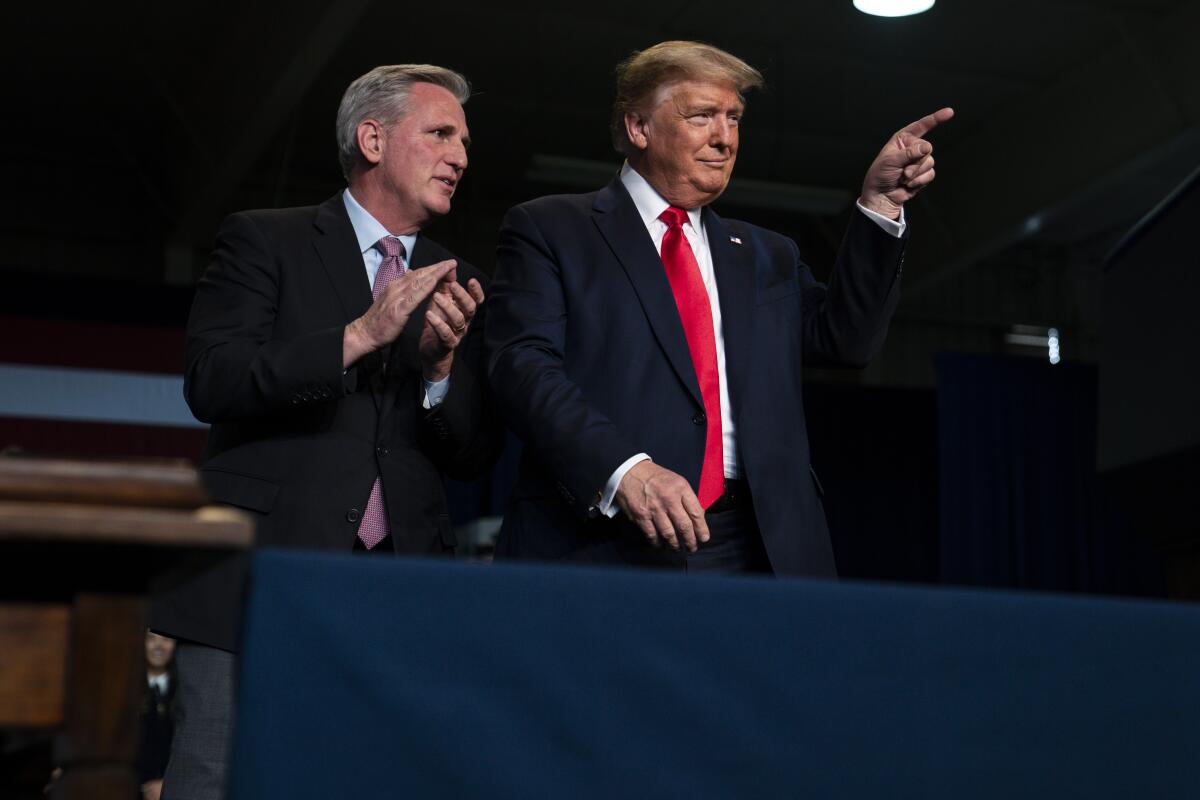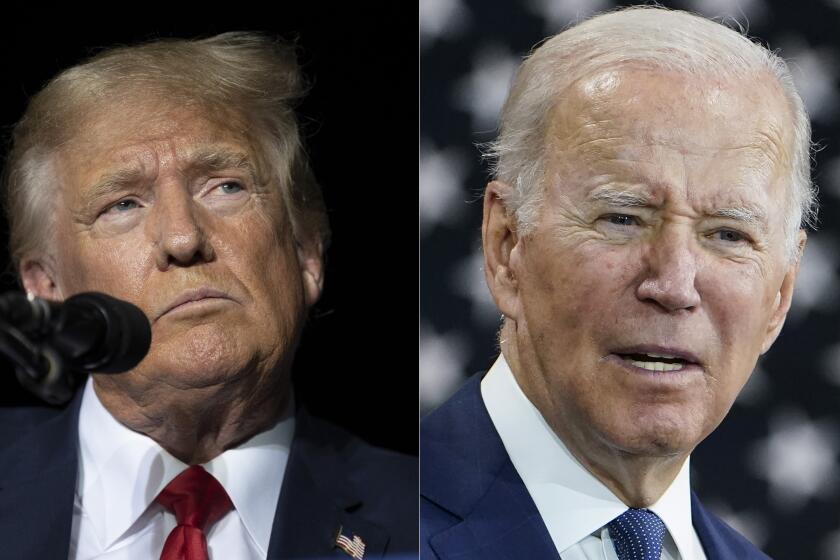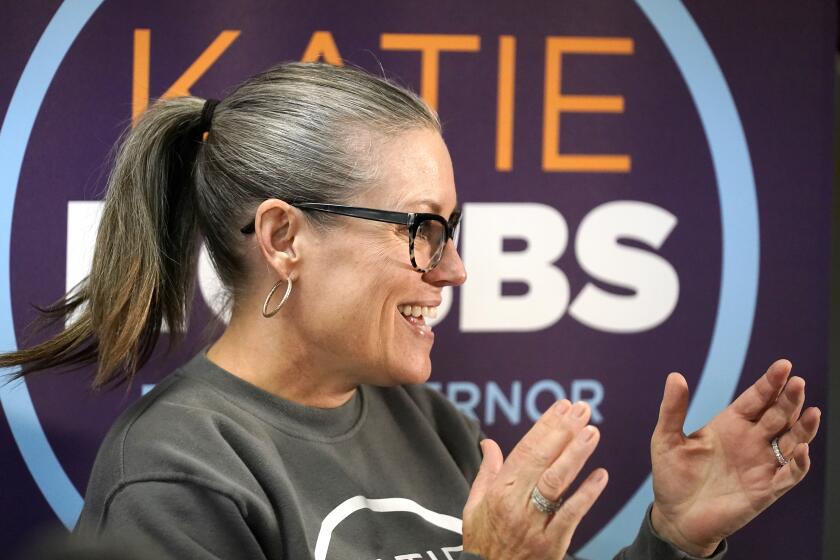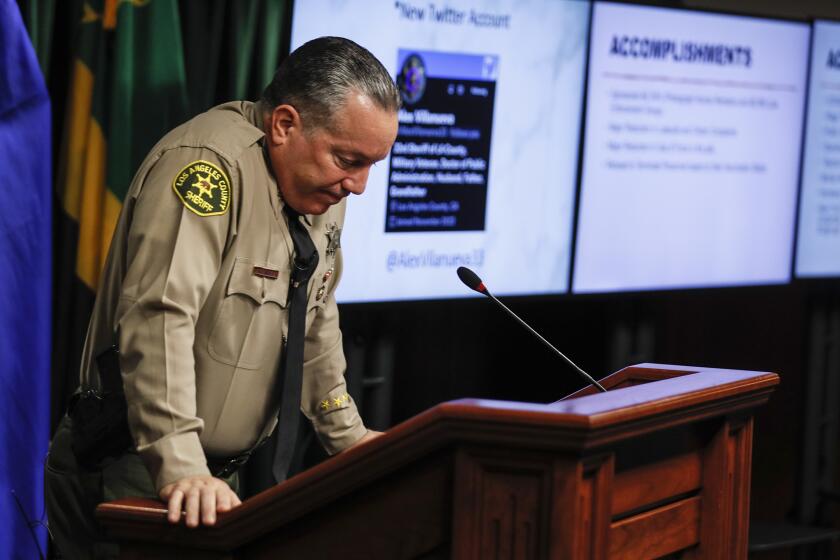Voter beware: Divided government will be an unholy mess

WASHINGTON — With election day two weeks away, Republican prospects of taking control of the House of Representatives, already strong, appear to have solidified. Barring the unexpected, President Biden’s next two years will be shaped by challenges from a House led by some of his most zealous opponents.
That isn’t unusual; every president for the last four decades has contended with divided government. Sometimes, that has arguably been a good thing — a constructive check on executive power.
Not now.
The House won’t merely be held by Republicans. It will be led by Republicans loyal to former President Trump, many of whom refuse to accept Biden’s legitimacy as president.
American democracy is under siege, but voter participation hasn’t been this high in a century. High levels of conflict generate engagement, even as they also provoke violence.
Most members of the new majority will have been elected with Trump’s endorsement. There will be almost no Trump critics in the House GOP — none who dare voice their qualms, at least. The caucus has been purged.
Of the 10 House Republicans who voted in favor of impeaching Trump after his supporters stormed the Capitol on Jan. 6, 2021, eight retired or lost primary elections. Only two are still on the ballot.
Of the likely members of the next majority, well more than half have questioned or denied the legitimacy of the 2020 presidential election. January’s incoming members will, not incidentally, be in the House when it considers the results of the presidential election of 2024.
Meanwhile, the ranks of the hard-line House Freedom Caucus are swelling. The group has been recruiting members among this year’s candidates and is on track to boast at least 46 next year, an all-time high.
The likely next House speaker, Rep. Kevin McCarthy (R-Bakersfield), is a Trump loyalist too. As Republican floor leader during the Trump administration, McCarthy worked to forge a relationship with the volatile president, who rewarded him with the slightly demeaning nickname “My Kevin.” McCarthy broke with Trump oh-so-briefly over the Jan. 6 riot but flew to Mar-a-Lago three weeks later to seek forgiveness.
McCarthy has made clear that other Trump acolytes will gain under his speakership. He has promised Rep. Jim Jordan of Ohio, one of the founders of the Freedom Caucus, the chairmanship of the powerful Judiciary Committee. He has promised Rep. Marjorie Taylor Greene of Georgia, who once suggested that California’s wildfires were caused by Jewish-funded space lasers, a seat on the Oversight Committee, which is likely to launch an investigation of Hunter Biden, the president’s wayward son.
Jordan and the Freedom Caucus were once considered GOP gadflies, in-House critics who challenged the less disruptive conservatism of Speakers John Boehner and Paul D. Ryan. Greene was considered an outlier whose ability to grab headlines was a problem, not an asset.
No longer. Both are now core members of a GOP conference whose mission is to fight the Biden administration to a standstill.
Their agenda begins with deep spending cuts in domestic programs, which they argue are needed to shrink the federal budget deficit and quell inflation.
Some members have already declared their willingness to shut down the federal government to get their way.
“Shut it down if necessary,” Rep. Bob Good of Virginia said last week. “Gridlock is a good thing compared to the alternative.”
Even worse, several have said they plan to block an increase in the federal debt ceiling — a move that would raise the specter of the government defaulting on its debts and risk a global financial crash.
McCarthy said he too would be willing to block a debt limit increase as a tactic to force spending cuts.
“OK, we’ll provide you more money, but you got to change your current behavior,” he told the newsletter Punchbowl News.
Government shutdowns and debt-ceiling hostage dramas tend to backfire on the party that launches them. Most voters don’t enjoy watching the economy being held hostage by politicians.
McCarthy presumably knows that — but he also knows his majority includes many who would relish a showdown, either on principle or to pander to right-wing voters.
In another sign that Republican radicals are in the ascendance, McCarthy said he wants to impose limits on future U.S. aid to Ukraine, a hobbyhorse of Fox News host Tucker Carlson.
“Ukraine is important, but … it can’t be a blank check,” McCarthy said.
It adds up to a recipe for a series of collisions — not only with the Biden White House but with the Senate. No matter how the election turns out, the Senate is almost certain to be narrowly divided between the parties — and because of its 60-vote filibuster rule, any major legislation will need support from at least a few senators on both sides.
In an earlier generation, Americans often viewed divided government as a sensible way to check the power of the president and even an opportunity for bipartisan deal-making.
Virginia’s Republican Gov. Glenn Youngkin sought to evoke that brand of nostalgia this month, arguing that GOP control of Congress could be “a calming influence.”
But there’s not much prospect of serenity from a House of Representatives led by McCarthy and his Trumpified party.
Pro-Trump voters who want to stop the Biden administration cold, no matter the cost, may enjoy the battle. But moderates and independents who vote for divided government, expecting anything better than chaos, are indulging in wishful thinking.
More to Read
Get the L.A. Times Politics newsletter
Deeply reported insights into legislation, politics and policy from Sacramento, Washington and beyond. In your inbox three times per week.
You may occasionally receive promotional content from the Los Angeles Times.












